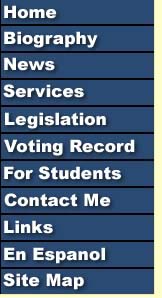


U.S. Senate Today Begins Debate on
New
Feinstein Border Security Bill
April 12, 2002
Washington, DC - The U.S. Senate today began the consideration of the Enhanced Border Security and Visa Entry Reform Act, legislation sponsored by Senators Dianne Feinstein (D-Calif.), Edward Kennedy (D-Mass.), Jon Kyl (R-Arizona) and Sam Brownback (R-Kansas) that would help prevent terrorists from entering the United States through loopholes in our immigration system.
The House passed this bill by voice vote on December 19, 2001 and a vote in the Senate is expected next week. The legislation (S.1749/H.R. 3525) has 61 cosponsors in the Senate.
"September 11th clearly pointed out to the shortcomings of our immigration and visa system," Senator Feinstein said. "It is unconscionable that a terrorist might be permitted to enter the United States simply because our government agencies don't share information. This bill is an important and strong first step toward fixing that system. It would dishonor the innocent victims of September 11th and the brave men and women of our armed forces who are defending our freedom at this very instant if we fail in this effort."
The Enhanced
Border Security and Visa Entry Reform Act would:
- Create
interoperable data system. The Administration would be required
to develop and implement an interoperable law enforcement and
intelligence data system by October 26, 2003 to provide the INS and
State Department immediate access to relevant law enforcement and
intelligence information. The database would be accessible to foreign
service officers issuing visas, federal agents determining the
admissibility of aliens to the U.S. and law enforcement officers
investigating and identifying aliens. The bill also prevents and
protects against the misuse of such data.
- Reform the visa
waiver program. The bill would require that each country
participating in the visa waiver program issue tamper-resistant,
machine-readable biometric passports to its nationals by
2003.
- Require the
reporting of lost or stolen passports. The INS would be
required to enter stolen or lost passport numbers into the interoperable
data system within 72 hours of notification of loss or theft. And until
that system is established, the INS must enter that information into an
existing data system.
- Require new requirements
for passenger manifests. All commercial flights and vessels coming to
the U.S. from international ports must provide manifest information
about each passenger, crew member, and other occupant prior to arrival.
This section of the bill also eliminates the 45-minute deadline to clear
arriving passengers.
- Require new travel
document measures. Requires all visas, passports, and other
travel documents to be fraud and tamper-resistant and contain biometric
data by October 26, 2003.
- Increase scrutiny
on nonimmigrants from certain countries. Prohibits the issuance
of nonimmigrant visas to nationals from countries designated as state
sponsors of international terrorism, unless the Secretary of State,
after consulting with the Attorney General and the heads of other
appropriate agencies, determines that the individuals pose no safety or
security threat to the United States.
- Institute student
visa reforms. Reforms the student visa process by:
- Requiring the Attorney
General to notify schools of the student's entry and requiring the
schools to notify the INS if a student has not reported to school within
30 days at the beginning of an academic term. (The monitoring program
does not, at present, collect such critical information as the student's
date of entry, port of entry, date of school enrollment, date the
student leaves school (e.g., graduates, quits), and the degree program
or field of study. That and other significant information will now be
collected.)
- Requiring the INS, in
consultation with the State Department, to monitor the various steps
involved in admitting foreign students and to notify the school of the
student's entry. It also requires the school to notify INS if a student
has not reported for school no more than 30 days after the deadline for
registering for classes.
- Mandating the INS to
conduct a periodic review of educational institutions to monitor their
compliance with record-keeping and reporting requirements. (If an
institution or program fails to comply, their authorization to accept
foreign students may be revoked. While the INS currently reviews
educational institutions, reviews have not been done consistently in
recent years and some schools are not diligent in their record-keeping
and reporting responsibilities.)
- Increase border
personnel. This section authorizes an increase of at least
1,000 INS inspectors, 1,000 INS investigative personnel, 1,000 Customs
Service inspectors, and additional associated support staff in each of
the fiscal years 2002 through 2006 to be employed at either the northern
or southern border.
- Increase INS pay
and staffing. To help INS retain border patrol officers and
inspectors, this section would raise their pay grade and permit the
hiring of additional support staff.
- Enhance Border
patrol and customs training. To enhance our ability to identify
and intercept would-be terrorists at the border, funds are provided for
the regular training of border patrol, customs agents, and INS
inspectors. In addition, funds are provided to agencies staffing U.S.
ports of entry for continuing cross-training, to fully train inspectors
in using lookout databases and monitoring passenger traffic patterns,
and to expand the Carrier Consultant Program.
- Improve DOS
information and training. This section authorizes funding to
improve the security features of the Department of State's (DOS)
screening of visa applicants. Improved security features include: better
coordination of international intelligence information; additional
staff; and continuous training of consular officers.
# # #